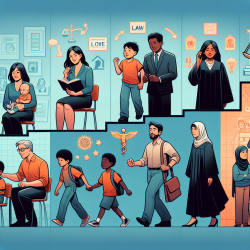Empowering Parents: A Journey Through Special Education
Parents are the heart of the special education process. They know their child better than anyone else and provide invaluable insights into their child's strengths and needs. Understanding the special education process, from evaluation to the development of an Individualized Education Program (IEP), empowers parents to be effective advocates for their child's educational success.
Understanding Special Education Needs
The journey begins with determining if a child needs special education. A child may qualify if they have a disability such as an intellectual disability, emotional disturbance, or autism, among others, and require special education services. In Pennsylvania, children eligible for special education have the right to a free, appropriate public education (FAPE).
Signs that your child may need special education include difficulties in communication, social interactions, or performing tasks related to reading, writing, or mathematics. Schools have screening processes to identify these needs, but parents can request an evaluation at any time.
The Evaluation Process
The evaluation process is comprehensive and involves a team of professionals, including school psychologists and specialists, who assess the child's needs. Parents play a crucial role in this process, providing valuable input that must be included in the evaluation. The outcome is an Evaluation Report (ER) that determines eligibility for special education services.
Developing the Individualized Education Program (IEP)
Once eligibility is determined, the IEP team, including parents, teachers, and school representatives, collaborates to create an IEP tailored to the child's needs. This document outlines the specific programs and services necessary for the child's progress and participation in the general curriculum. The IEP is reviewed annually, but can be updated more frequently if needed.
Parental Rights and School Responsibilities
Parents have specific rights, including access to their child's educational records and the right to participate in IEP meetings. Schools are responsible for maintaining the confidentiality of these records and ensuring that the educational environment is conducive to learning for all students.
Dispute Resolution
Disagreements between parents and schools can occur. Parents have several options for resolving disputes, including mediation and due process hearings. These processes are designed to ensure that the child's educational needs are met and that parents have a voice in their child's education.
For more information, please follow this link.










